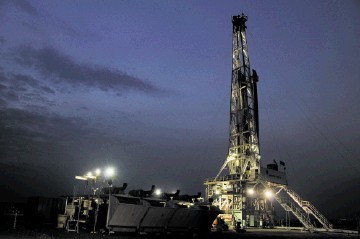
IN JANUARY 2009, Heritage Oil, in partnership with Tullow Oil, announced that exploration on concessions in the Lake Albert Basin in Uganda held over 2billion barrels in reserves, far exceeding the commercial viability threshold.
Indeed the Lake Albert find has enhanced foreign investor confidence in eastern Africa’s energy potential while, for Uganda, it promises to boost its heavily aid-dependent economy.
But despite the euphoria, prospects for Uganda’s oil industry are off to a rocky start. With a frail regulatory environment, recent allegations of corruption, and insecurity (both internal and external) threatening the oil-rich border regions, and investors are warned that this state is showing signs of the so-called ‘resource curse’, which points to political and security risks.
Border insecurity
When President Museveni was recently criticised for spending around $780million on six SU-30 MK2 Russian-made fighter jets, depleting national reserves, he claimed that the purchases were critical to secure oil investments, citing “unfriendly neighbours”.
An increasing number of attacks by armed gangs around the Uganda-DRC border do present potential problems for the emerging oil industry.
The border cuts straight through Lake Albert while its shores on both sides run along the Albertine Rift where the majority of the oil has been found.
Sporadic skirmishes between Uganda and DRC government forces, militias, and local people have erupted in the Lake Albert area since Heritage hit oil there in 2006. Over 100 people have been kidnapped in this area in attacks linked to fights over ransoms, minerals and oil. The most recent attack on the border town Mutungo on August 2 by the Mai-Mai militia displaced 70,000 residents.
The most persistent oil security problems, however, are likely to be internal. Several land disputes have already been sparked in the oil-rich Bunyoro region by the activities of land speculators, with complaints by farmers that compensation for the destruction of crops was insufficient (after the government lowered the rates earlier this year) or were not paid at all.
Public anger and anti-government riots are on the rise in Uganda, and disputes between landowners, IOCs (international oil companies) and the government are likely to intermittently spill over into violence.
Legal uncertainty
Uganda is not scheduled to produce oil until 2015. However, the limitations of the country’s weak regulatory environment, compounded by government inexperience, is already apparent.
The ongoing dispute regarding Heritage’s supposed capital gains tax debt to the government is indicative of this. This sporadic tax demand reflects governmental disarray, as well as irritation over a deal that saw President Museveni trumped by corporate hubris.
The government’s position – that existing income and tax laws are adequate for its burgeoning oil industry – demonstrates that it does not understand the unique nature of the sector, and thus future disputes are likely.
While recent claims that Ireland’s Tullow Oil made corrupt payments of $22.59million to Uganda’s foreign minister, Sam Kahamba Kutesa, and other state officials have been deemed forgeries, oil politics is already posing a threat to Uganda’s industry.
On October 22, lawmakers voted to rescind a resolution blocking Tullow’s sale of oil blocks to French Total and China’s CNOOC (investment needed to ensure that Lake Albert comes on stream by 2015). At the time of writing however, parliament was yet to vote on this.
Despite the allegations being unfounded, the fact that they were tabled by parliament on October 10, in a clear aggressive attempt to discredit Tullow, shows that Uganda is not immune to murky oil politics. Given ruling party MP support for the suspension of the deal, Museveni’s party is also clearly restive.
Increasingly canny in his dealings with the companies, Museveni has also started to demand changes to the three main production sharing agreements. In September, he attempted to eradicate a “stabilisation clause”, so as to allow the companies to be taxed more heavily in the future.
Tullow reportedly offered to uphold stricter environmental standards but stood firm over the risk premium. Museveni is already playing a risky game with the oil companies; across the border in the DRC, political intervention in negotiations has all but frozen work on oil production.
Eastern Africa stands on the cusp of an oil-driven energy revolution and Uganda holds a key position in the regional domestic energy market.
But its volatile politics and frail regulation really do leave this nation open to the resource curse.
The recent bribery allegations suggest that the Ugandan parliament is alert to the signs, but in the meantime, Museveni’s oil motto of “Norway not Nigeria” is not convincing.
The absence of an oil-specific revenue framework and oil politics surfacing in Uganda’s parliament raises the prospect that the country is ill-prepared for this revolution.
Managing revenues and local populations in ways that exacerbate internal insecurity, coupled with a failure to develop a transparent, accountable sector are likely for the short term and present challenges to energy security for Uganda’s now fast developing oil sector.
Hannah Waddilove is a specialist in sub-Saharan Africa at AKE Ltd